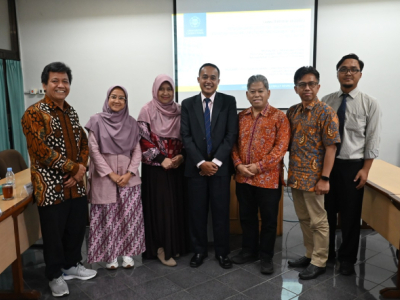Research on Economic Behavior of Muslim Communities in Indonesia

Dr. Mustofa, M.Sc., a lecturer at UNY's Faculty of Economics and Business (FEB), just graduated with a doctorate in Islamic Economics and Halal Industry from Universitas Gadjah Mada (UGM). Mustofa defended his dissertation, "The Impact of Religiosity and Education on the Economic Behavior of Muslim Communities in Indonesia," on Tuesday (10/1) with Prof. Dr. Chess Sugiyanto, MA (Promoter) and Akhmad Akbar Susamto, SE., M.Phil., Ph.D. (Co-Promoter). This dissertation was successfully defended in front of the board of examiners, Dr. Reni Rosari, M.B.A., Evita Hanie Pangaribowo, S.E., MIDEc., Ph.D., Prof. Dr. Samsubar Saleh, M.Soc.Sc., and Prof. Rizal Yaya, SE., M.Sc., Ph.D., CA., Akt..
In his dissertation, he discusses six economic behaviors: redistribution preferences, tax compliance, risk behavior, smoking habit, and arisan (a rotating savings and credit association) participation. The six economic behaviors have inconsistent behavioral preferences or irrational behavior.
Mustofa stated that the economic behavior of Muslim communities is not only based on rationality but also based on emotions, individual backgrounds, customs, and beliefs (religiosity) which which frequently contradict logic.
The lecturer of the Department of Economic Education FEB UNY concluded that the government needs to pay attention to aspects of religiosity in optimizing Indonesia's economic development. Collaboration between the government and religious leaders is needed for policy effectiveness.(Writer : Mustofa/Fadhli, Editor : Dedy, Translator : Dewi)

